Group 2 The influence of personality on the university students' career choice
一篇关于基因影响性格的英语作文
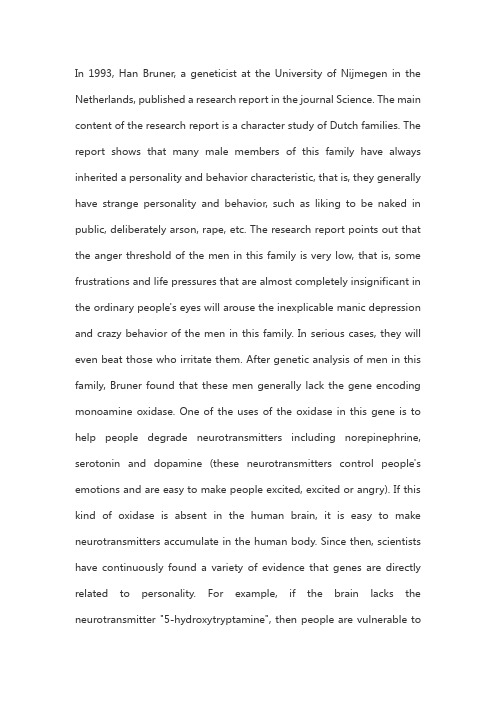
In 1993, Han Bruner, a geneticist at the University of Nijmegen in the Netherlands, published a research report in the journal Science. The main content of the research report is a character study of Dutch families. The report shows that many male members of this family have always inherited a personality and behavior characteristic, that is, they generally have strange personality and behavior, such as liking to be naked in public, deliberately arson, rape, etc. The research report points out that the anger threshold of the men in this family is very low, that is, some frustrations and life pressures that are almost completely insignificant in the ordinary people's eyes will arouse the inexplicable manic depression and crazy behavior of the men in this family. In serious cases, they will even beat those who irritate them. After genetic analysis of men in this family, Bruner found that these men generally lack the gene encoding monoamine oxidase. One of the uses of the oxidase in this gene is to help people degrade neurotransmitters including norepinephrine, serotonin and dopamine (these neurotransmitters control people's emotions and are easy to make people excited, excited or angry). If this kind of oxidase is absent in the human brain, it is easy to make neurotransmitters accumulate in the human body. Since then, scientists have continuously found a variety of evidence that genes are directly related to personality. For example, if the brain lacks the neurotransmitter "5-hydroxytryptamine", then people are vulnerable todepression. Coincidentally, as early as 1930, an American university had done the famous "Minnesota Twin Experiment" on the relationship between human personality and genes. At that time, the United States was experiencing an unprecedented economic crisis. A large number of Americans lost their jobs, and many American families fell into living difficulties. At that time, contraceptives and condoms had not been widely used, contraceptive methods were backward, the pregnancy rate of women was soaring, and the unemployed people at home unintentionally increased the family population. Most poor families have too many children to support, so they have to send them to welfare institutions. In a particularly poor family, there are many children who may give birth to twins at once. However, the whole family has no sense of joy and only worries about how to feed them. As a result, one or both twins are usually sent to welfare institutions for adoption by wealthy families with money but no children. According to the medical indications, twins refer to two individuals born at one time from a viviparous animal. Generally, twins are divided into identical twins and fraternal twins. The average birth rate of twins in the world is only 1:89. From the perspective of medical indications, there are often two possibilities for the appearance of twins: they are split from the same fertilized egg (identical twins); It is formed by fertilization of two different eggs (fraternal twins). Since identical twins are developed froma fertilized egg, that is, the same fertilized egg splits into two cells before it is implanted in the uterus and develops into adults, their genes are 100% the same, and the two fetuses will have the same gender genetic factors. That is, as you can see, the appearance looks very similar, which is difficult for outsiders to distinguish, and sometimes even the biological parents are easy to confuse. While fraternal twins are developed from different fertilized eggs, mainly showing the same or different sex, and their appearance and genetic factors are similar to those of other siblings born at different times. After the birth of fraternal twins, they usually have the same living environment. Therefore, although they are heterozygotes, they are still very similar to other brothers and sisters born in different time periods, and can be recognized at a glance. After receiving the twins, American welfare institutions will send the adopted children to the families in need according to the needs of the families applying for them. During this period, some twins were lucky to be adopted by the same family, while others were separated and adopted by different families. In the "twin experiment", the American university cooperated with welfare institutions. They intended to send identical twins (identical in appearance and personality) to families with different environments for adoption. These adoptive families differ in nationality, language, religious belief, parents' personality, education level, wealth, occupation,social status, etc. The purpose of the researchers is to observe the similarities and differences between these identical twins who grow up in different environments and those who grow up in adulthood. In particular, whether there will be a big gap in personality, psychology, and spiritual consciousness, so as to find out whether a person's personality and achievements are caused by the acquired environment or determined by congenital genes. Since then, the experimental results have proved that although most identical twins have grown up in different environments, they are still very similar or even similar in personality, and most of them also have the same growth preferences, interests and life experiences. From this, the scientists concluded that 50% of the factors that determine human character come from congenital genetic genes. The acquired environment and education account for the other half of the cultivation of human character. So, is the influence of acquired environment on character negligible? This test result strongly verified a fact once again: 1. The influence of human personality gene on personality is extremely stable. It is completely independent of environmental factors and is not affected by environmental factors. 2. Environment plays a certain role in shaping personality, and personality is quite sensitive to environment. 3. The biggest determinant of human emotional intelligence (IQ) is gene. The growth environment has a certain influence on it but does not play adecisive role. It can be seen that gene has a great say in human personality and hobbies. It can almost be said that people are determined by their own genetic type. However, it is also suggested that the environment after tomorrow is the decisive factor for a person to become someone. Here, relevant scientific research shows that genes do determine people's personality, interests and hobbies to a large extent, but people's IQ, knowledge and personal achievements are largely affected by the acquired growth environment. From this perspective, parents should be soberly aware when raising children that some of their children's personalities, interests and hobbies cannot be changed and should be respected. Because their personality characteristics are actually a genetic manifestation of their parents' own genes. When parents encounter difficult problems during childcare, such as children's impatient, sloppy, like to confront themselves, stubborn, stubborn, timid, sensitive, boastful and other personality problems, parents should not just criticize the children, but should look at the children's personality problems at a higher level, try to find the root cause from themselves, find solutions, and overcome the personality problems with the children. In terms of IQ training, thinking training, learning habits training, ways of dealing with people and other aspects, parents can teach children in accordance with their aptitude according to their personality and temperament. On the premise of avoiding amplification or strongpersonality defects, they can achieve targeted education and guidance, so that children can promote their strengths and avoid weaknesses, and grow smoothly.。
影响人们个性的因素英语作文
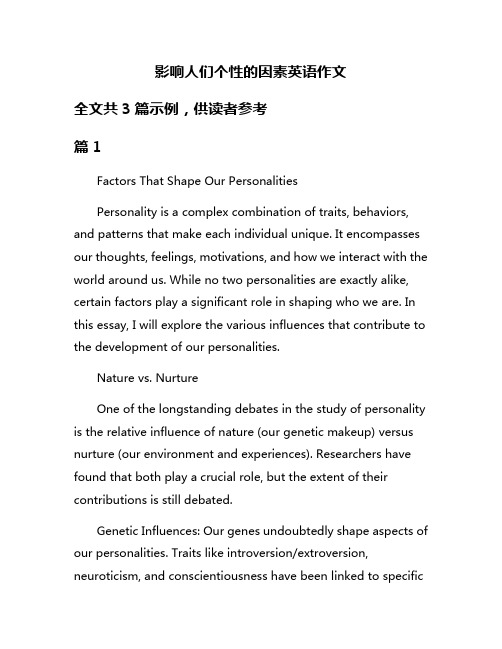
影响人们个性的因素英语作文全文共3篇示例,供读者参考篇1Factors That Shape Our PersonalitiesPersonality is a complex combination of traits, behaviors, and patterns that make each individual unique. It encompasses our thoughts, feelings, motivations, and how we interact with the world around us. While no two personalities are exactly alike, certain factors play a significant role in shaping who we are. In this essay, I will explore the various influences that contribute to the development of our personalities.Nature vs. NurtureOne of the longstanding debates in the study of personality is the relative influence of nature (our genetic makeup) versus nurture (our environment and experiences). Researchers have found that both play a crucial role, but the extent of their contributions is still debated.Genetic Influences: Our genes undoubtedly shape aspects of our personalities. Traits like introversion/extroversion, neuroticism, and conscientiousness have been linked to specificgenetic markers. Twin studies have shown that identical twins, who share the same genetic code, tend to have more similar personalities than fraternal twins, even when raised in different environments.Environmental Influences: While our genes provide a foundation, our experiences and surroundings also profoundly impact our personalities. The way we are raised, the relationships we form, and the challenges we face all contribute to shaping who we become. Children who grow up in nurturing, supportive environments tend to develop more positive personality traits, while those exposed to trauma or neglect may struggle with anxiety, low self-esteem, or aggression.The interplay between nature and nurture is complex, and most experts agree that both play a significant role in personality development.Family and Early Childhood ExperiencesOur family environment and early childhood experiences are among the most influential factors in shaping our personalities. From birth, we absorb the values, beliefs, and behaviors of our primary caregivers, which can profoundly impact our worldview and how we perceive ourselves and others.Parenting Styles: Research has shown that different parenting styles can lead to distinct personality traits in children. Authoritative parenting, which strikes a balance between warmth, support, and reasonable discipline, is associated with higher self-esteem, better social skills, and stronger academic performance in children. Conversely, authoritarian or permissive parenting styles can contribute to more negative personality traits, such as aggression, low self-control, or a lack of motivation.Birth Order: Birth order has also been linked to personality differences among siblings. Firstborns tend to be more conscientious, responsible, and achievement-oriented, while later-born children may be more rebellious, attention-seeking, and sociable.Attachment and Relationships: The quality of our earliest relationships, particularly with primary caregivers, can have a lasting impact on our personalities. Children who form secure attachments with their parents are more likely to develop positive traits like trust, empathy, and emotional regulation. Conversely, insecure or disrupted attachments can contribute to anxiety, low self-esteem, and difficulties forming healthy relationships later in life.Cultural InfluencesThe culture in which we are raised also plays a significant role in shaping our personalities. Cultural norms, values, and expectations shape our beliefs, attitudes, and behaviors from an early age.Individualistic vs. Collectivistic Cultures: In individualistic cultures, such as those found in Western countries, personal achievement, independence, and self-expression are highly valued. These cultural values often contribute to more assertive, competitive, and individualistic personality traits. In contrast, collectivistic cultures, common in many Asian and Latin American societies, emphasize group harmony, loyalty, and interdependence. These values can foster more cooperative, modest, and socially oriented personality traits.Gender Roles and Expectations: Cultural gender roles and expectations also influence personality development. In societies with more traditional gender norms, individuals may be encouraged to adopt personality traits that align with these expectations, such as assertiveness and competitiveness for men, and nurturing and empathy for women.Religion and Spirituality: Religious and spiritual beliefs can also shape personality traits. For example, religions thatemphasize humility, compassion, and selflessness may contribute to the development of personality traits like agreeableness and conscientiousness.Life Experiences and Significant EventsOur personalities are not static; they continue to evolve and change throughout our lives in response to significant experiences and events.Trauma and Adversity: Traumatic events, such as abuse, natural disasters, or the loss of a loved one, can profoundly impact our personalities. Individuals who have experienced trauma may develop personality traits like anxiety, depression, or post-traumatic stress disorder (PTSD). However, some individuals also exhibit resilience and personal growth in the face of adversity.Major Life Transitions: Significant life transitions, such as starting a new job, getting married, or becoming a parent, can also shape our personalities. These experiences may require us to develop new skills, adapt to new roles, and adjust our priorities, leading to changes in our personality traits.Educational and Career Experiences: Our educational and career experiences also contribute to our personalitydevelopment. The skills and knowledge we acquire, the challenges we face, and the environments we work in can all influence our personality traits, such as conscientiousness, openness to experience, and emotional stability.Peer Influences and Social EnvironmentsThe social environments we inhabit and the people we interact with also play a crucial role in shaping our personalities.Peer Groups: During adolescence and early adulthood, peer groups can have a significant influence on personality development. Individuals may adopt attitudes, behaviors, and personality traits that align with their peer group's norms and values, either to fit in or as a form of rebellion.Social Roles and Expectations: The social roles we occupy and the expectations placed upon us by society can also shape our personalities. For example, individuals in leadership positions may develop more assertive, confident, and decisive personality traits, while those in caregiving roles may cultivate traits like empathy, nurturing, and patience.Media and Popular Culture: In today's media-saturated world, popular culture and mass media also contribute to the formation of personality traits. Exposure to certain mediamessages and depictions of personality types can influence individuals, particularly young people, to adopt or reject certain personality traits.ConclusionIn summary, our personalities are shaped by a complex interplay of various factors, including our genetic makeup, family environment, cultural influences, life experiences, and social environments. While some aspects of our personalities may be relatively stable over time, others continue to evolve and adapt in response to the challenges and opportunities we encounter throughout our lives. Understanding these influences can help us better appreciate the diversity of human personality and the unique journeys that shape each individual's character.篇2Factors that Influence PersonalityEach person is a unique individual, molded by the interplay of diverse forces that shape their personality over time. Personality is a complex tapestry woven from the threads of our genes, our upbringing, our life experiences, and the social and cultural environments in which we are immersed. In this essay, Iwill explore the multifaceted factors that contribute to the development of our distinctive personalities.Nature vs. Nurture: The Age-Old DebateThe nature versus nurture debate has been a longstanding discourse in the field of psychology, attempting to unravel the relative contributions of genetics and environmental influences on personality. While it is widely accepted that both play a role, the extent to which each factor shapes our personalities remains a topic of ongoing research and discussion.Genetic InfluencesOur genes serve as the blueprint for our physical and psychological traits, including personality characteristics. Twin studies have provided compelling evidence that certain personality dimensions, such as introversion or extroversion, have a genetic component. However, it is important to note that genes do not determine our personalities in a deterministic fashion; rather, they interact with environmental factors in complex ways.Temperament and Early ExperiencesFrom the moment we are born, our temperament – the innate and biologically-based tendencies that shape ouremotional reactivity, attention, and behavior – begins to shape our personality. An infant's temperament, whether easy-going or fussy, can influence the way caregivers respond to them, which in turn can shape the child's developing personality.Moreover, the quality of our early experiences, particularly the attachment bonds we form with our primary caregivers, can have a profound impact on our personality development. Secure attachments foster traits like trust, resilience, and emotional regulation, while insecure attachments can contribute to anxiety, low self-esteem, and difficulties in forming healthy relationships.Parenting Styles and Family DynamicsThe parenting styles we experience can significantly influence our personality development. Authoritative parenting, which strikes a balance between warmth and firm boundaries, is often associated with the development of self-confidence,self-control, and social competence. In contrast, authoritarian or permissive parenting styles can contribute to traits such as aggression, low self-esteem, or impulsivity.Family dynamics, including the relationships between siblings, the presence or absence of role models, and the overall family environment, can also shape our personalities. Positive family experiences can foster traits like empathy, cooperation,and emotional intelligence, while negative experiences, such as abuse or neglect, can contribute to maladaptive personality traits.Social and Cultural InfluencesPersonality development does not occur in a vacuum; it is profoundly influenced by the social and cultural contexts in which we are embedded. The values, norms, and expectations of our sociocultural environments can shape our beliefs, attitudes, and behaviors, which in turn contribute to the formation of our personalities.Peer groups, particularly during adolescence, can exert a powerful influence on personality development. Individuals may adopt certain personality traits or behaviors to conform to the norms of their peer groups or to establish their social identities.Cultural values and belief systems also play a significant role in shaping personality. For instance, cultures that emphasize individualism may foster traits like independence and assertiveness, while collectivistic cultures may emphasize traits such as interdependence and conformity.Life Experiences and Personal NarrativesOur life experiences, both positive and negative, can profoundly shape our personalities. Traumatic events, such as abuse, accidents, or natural disasters, can contribute to the development of personality disorders or maladaptive coping mechanisms. Conversely, positive experiences, such as achieving personal goals or overcoming challenges, can foster resilience, self-efficacy, and personal growth.Moreover, the way we interpret and construct personal narratives around our experiences can influence our personalities. Our self-narratives shape our self-concept, beliefs, and emotional responses, which in turn shape our behavior and interactions with others.The Role of Education and LearningEducation and learning experiences can also play a significant role in personality development. Formal education can expose individuals to diverse perspectives, knowledge, and ways of thinking, which can broaden their worldviews and shape their personalities.Informal learning experiences, such as travel, hobbies, or personal projects, can also contribute to personality development by fostering new skills, interests, and perspectives.Personality Stability and ChangeWhile personality traits tend to exhibit relative stability over time, particularly after emerging adulthood, our personalities are not set in stone. Significant life events, major transitions, or conscious efforts at personal growth can lead to personality changes throughout our lifetimes.The concept of personality plasticity suggests that our personalities can adapt and evolve in response to changing circumstances, new experiences, and personal development efforts. This highlights the dynamic and flexible nature of personality, which continues to be shaped by the interplay of various factors over the course of our lives.ConclusionIn conclusion, personality development is a complex and multifaceted process influenced by a myriad of factors, including genetics, temperament, early experiences, parenting styles, social and cultural influences, life experiences, education, and personal narratives. Understanding these diverse influences can provide insights into the unique tapestry that comprises each individual's personality.Recognizing the interplay of these factors can also help us appreciate the diversity of human personalities and foster greater understanding, empathy, and acceptance of individual differences. Ultimately, embracing the richness of human personality is a testament to the complexity and wonder of the human experience.篇3Factors that Influence Our PersonalitiesWe are all unique individuals, shaped by the experiences and circumstances that make up our lives. While our genetic makeup lays the foundation for our personalities, there are numerous external factors that also play a significant role in molding who we are. In this essay, I will explore some of the key influences that contribute to the development of our personalities.Nature vs. NurtureOne of the longstanding debates in psychology revolves around the relative importance of nature (our genetic inheritance) and nurture (our environment and experiences) in shaping our personalities. While it is widely accepted that both play a role, the extent to which each factor contributes is still a subject of ongoing research and discussion.Genetics undoubtedly play a crucial part in determining our basic temperament and tendencies. Traits such as introversion or extroversion, emotional stability, and even risk-taking behavior have been linked to specific genetic variations. However, it is important to note that these genetic predispositions do not determine our personalities in a rigid or deterministic way. They merely provide a starting point, a canvas upon which our experiences and environment can paint the intricate details of our individual personalities.Family EnvironmentOne of the most significant nurturing influences on our personalities is our family environment. From the moment we are born, we are exposed to the values, beliefs, and behaviors of our parents and immediate family members. The way we are raised, the emotional support (or lack thereof) we receive, and the dynamics within our family unit all contribute to shaping our personalities.Children raised in loving, supportive environments tend to develop a sense of security, confidence, and positive self-esteem. Conversely, those who grow up in dysfunctional or abusive households may struggle with issues such as low self-worth, trust issues, and emotional instability. The relationships we have withour siblings and the roles we play within the family can also have a lasting impact on our personalities.Cultural and Social InfluencesBeyond our immediate family, the cultural and social environments in which we are raised also play a significant role in shaping our personalities. Cultural norms, values, and beliefs can influence our attitudes, behaviors, and perspectives on various aspects of life.For example, individuals raised in cultures that emphasize collectivism may be more likely to develop personalities that prioritize group harmony and interdependence. In contrast, those raised in more individualistic societies may tend to value personal autonomy and self-expression to a greater degree.Social influences, such as our peer groups, educational experiences, and the media we consume, can also shape our personalities. The people we associate with, the values they hold, and the behaviors they model can subtly (or sometimes overtly) influence our own beliefs, attitudes, and ways of interacting with the world.Life Experiences and Pivotal EventsThroughout our lives, we encounter a myriad of experiences, both positive and negative, that can profoundly impact our personalities. Significant life events, such as trauma, loss, or major achievements, can trigger shifts in our perspectives, coping mechanisms, and overall worldviews.For instance, individuals who have experienced traumatic events may develop traits such as heightened vigilance, anxiety, or emotional guardedness as a coping mechanism. On the other hand, those who have overcome significant challenges or achieved remarkable successes may develop greater resilience, confidence, and a sense of self-efficacy.Personal Choices and Self-ReflectionWhile many factors that shape our personalities are external, it is important to recognize the role of personal agency and self-reflection. As we mature and gain self-awareness, we have the ability to consciously examine our beliefs, behaviors, and patterns of thought, and make intentional choices to shape our personalities in ways that align with our values and goals.Through introspection, therapy, or personal growth practices, we can identify and work on aspects of our personalities that we wish to change or enhance. This process ofself-discovery and personal growth can lead to profound shifts in our attitudes, emotional regulation, and overall sense of self.ConclusionIn conclusion, our personalities are shaped by a complex interplay of nature and nurture, encompassing our genetic predispositions, family environments, cultural and social influences, life experiences, and personal choices. While some factors may have a stronger influence than others, it is the unique combination of these elements that makes each of us a distinct and multifaceted individual.By understanding the various factors that contribute to personality development, we can gain greater self-awareness and potentially make conscious choices to cultivate the aspects of our personalities that we value most. Ultimately, our personalities are not static or immutable; they are ever-evolving reflections of our journeys through life.。
性格外貌英语作文模板

性格外貌英语作文模板Title: Exploring Personality Traits and Physical Appearance。
Introduction:Personality and physical appearance are two facets that shape an individual's identity. While personality reflects one's inner characteristics and behaviors, physical appearance often forms the initial impression we make on others. In this essay, we delve into the intricate relationship between personality traits and physical appearance, exploring how they intertwine and influence each other.Body:1. The Influence of Personality on Physical Appearance:Personality traits can manifest in physicalappearance through various channels:Facial Expressions: For instance, individuals with cheerful personalities often wear smiles, which can make their faces appear more approachable and friendly.Body Language: Confident individuals may stand tall with open postures, exuding an aura of self-assurance.Grooming Habits: Attention to personal grooming can reflect conscientiousness and attention to detail.Fashion Choices: Personal style often mirrors one's personality, whether it's quirky and adventurous or classic and refined.2. Perceptions of Physical Appearance:How one perceives physical appearance can be influenced by personality:Self-Perception: Individuals with high self-esteemmay view themselves more positively, enhancing their attractiveness in their own eyes.Social Perception: People often project their personality onto others, perceiving attractive traits in individuals with whom they share similar characteristics or values.Cultural Influences: Cultural norms shape our ideals of physical beauty, but personality can also affect these perceptions. For example, cultures valuing extroversion might find outgoing individuals more attractive.3. The Interplay Between Personality and Attractiveness:Research suggests that certain personality traitsare commonly associated with attractiveness:Confidence: Confidence is universally attractive, as it signals self-assurance and assertiveness.Kindness: Kindness is often considered attractive,as it indicates empathy and warmth.Sense of Humor: A good sense of humor can enhance attractiveness by fostering connections through laughterand shared experiences.4. Challenges and Misconceptions:Despite the correlation between personality and physical appearance, it's essential to avoid misconceptions:Stereotyping: Assuming specific personality traits based solely on physical appearance can lead to unfair judgments and stereotypes.Individual Differences: Not all individuals conformto stereotypes associated with their appearance. It'scrucial to recognize the diversity of personalities within any group.Conclusion:In conclusion, personality and physical appearance are intertwined aspects of individual identity, eachinfluencing and reflecting the other in complex ways. While personality traits can shape how we present ourselves physically, perceptions of physical attractiveness can also be influenced by personality. By understanding this interplay, we can appreciate the richness and diversity of human expression, moving beyond surface judgments to embrace the complexity of individual personalities.。
性格对人际交往的影响英语小作文
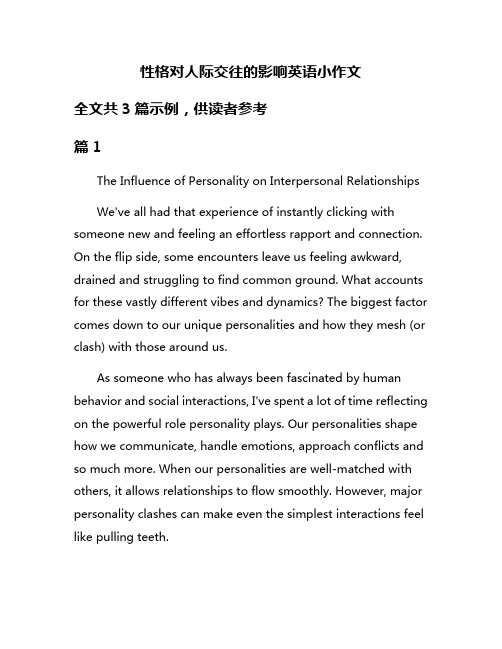
性格对人际交往的影响英语小作文全文共3篇示例,供读者参考篇1The Influence of Personality on Interpersonal RelationshipsWe've all had that experience of instantly clicking with someone new and feeling an effortless rapport and connection. On the flip side, some encounters leave us feeling awkward, drained and struggling to find common ground. What accounts for these vastly different vibes and dynamics? The biggest factor comes down to our unique personalities and how they mesh (or clash) with those around us.As someone who has always been fascinated by human behavior and social interactions, I've spent a lot of time reflecting on the powerful role personality plays. Our personalities shape how we communicate, handle emotions, approach conflicts and so much more. When our personalities are well-matched with others, it allows relationships to flow smoothly. However, major personality clashes can make even the simplest interactions feel like pulling teeth.To dig deeper into this, I think it's helpful to look at some of the key personality traits that impact our interpersonal relationships:Extroversion vs. IntroversionThis is probably one of the most noticeable factors that affects our social dynamics. Extroverts tend to be outgoing, assertive and energized by socializing. They're often viewed as the "life of the party" types. Introverts, on the other hand, are generally more reserved, thoughtful and find social situations more draining. These contrasting perspectives can lead to misunderstandings and frustrations.For example, an extrovert might perceive an introvert as rude or standoffish when they're simply feeling overstimulated. An introvert may get annoyed by an extrovert's need to be the center of attention. However, these two personalities can actually complement each other well if they make an effort to understand and accommodate one another. The extrovert can create opportunities for the introvert to open up more, while the introvert provides a calming balance.AgreeablenessThis refers to a person's general warmth, cooperativeness and ability to get along with others. Those high in agreeableness tend to be compassionate, polite and focused on maintaining positive relationships. Those low in agreeableness are more skeptical, confrontational and willing to rock the boat.You can probably imagine how these clashing styles could spark major tensions. The agreeable person may feel like they're constantly having to smooth things over and walk on eggshells with the less agreeable party. Meanwhile, the disagreeable person may view the other as a pushover who avoids necessary conflicts. However, when navigated skillfully, this dynamic allows for a nice balance of diplomacy and candor.ConscientiousnessConscientiousness relates to a person's level ofself-discipline, organization and goal orientation. Highly conscientious individuals are typically hard workers who think before they act. Those low in conscientiousness often display a more spontaneous, carefree attitude.In a professional setting, the conscientious person may get frustrated with a lazier coworker. In a friendship or relationship, the more easygoing person could feel nagged or micromanaged by someone who is overly scheduled and rigid. However, theseconflicting styles can help balance each other out – the conscientious mindset provides helpful structure and planning, while the more spontaneous outlook encourages going with the flow.Emotional StabilityThis dimension is associated with how calm, secure and resilient someone is under pressure or stress. Those high in emotional stability tend to be more even-keeled and rational, while those low in this trait are more prone to moodiness, anxiety and emotional volatility.The emotionally stable person can help defuse tense situations and offer a grounding presence. But they may also come across as cold or ambivalent to the more sensitive, emotionally expressive individual. Meanwhile, the emotionally reactive person can bring passion and depth, but may also create conflicts and drama without meaning to.There are so many other factors like openness to experience, assertiveness, need for personal space and more that shape our relational dynamics. At the end of the day, there's no perfect personality combination – each pairing comes with its own set of advantages and challenges.The key is developing heightened self-awareness about our own personalities and consciously adapting to accommodate the personalities of those around us. We don't have to fundamentally change who we are, but we can modify our communication styles and approaches to be more inclusive of differing perspectives.When we take the time to understand where someone is coming from and appreciate our differences, it allows for much richer and more fulfilling relationships. We get exposed to viewpoints that challenge our blind spots. We learn to flex our patience and open-mindedness muscles. Our lives become more dynamic and multi-dimensional.While personality disconnects can certainly create friction, they also present opportunities for tremendous growth, both individually and interpersonally. By being proactive about bridging those gaps, we learn invaluable skills like empathy, compromise and conflict-resolution that strengthen all of our relationships.I know this is something I'll be continuously working on as I navigate new social and professional spheres. Building this awareness now will pay major dividends down the road as I encounter an ever-widening range of personalities andbackgrounds. It's an endless journey of evolving as a communicator and cultivating those all-important interpersonal skills.篇2The Impact of Personality on Interpersonal RelationshipsWe've all had that friend who is the life of the party - outgoing, talkative, and able to work the room effortlessly. Or maybe you know someone who is more reserved, thoughtful, and quiet. The way we interact with others is heavily influenced by our unique personalities and traits. In this essay, I'll explore how different personality types can shape our interpersonal relationships.To begin, let's consider the role of extraversion versus introversion. Extraverts tend to be more outgoing, sociable, and energetic. They thrive in social situations and often have wide networks of friends and acquaintances. Introverts, on the other hand, are typically more reserved and inward-focused. They may feel drained by too much social stimulation and prefer quieter, more intimate interactions.How might these differences play out in relationships? Well, an extraverted person may be more likely to initiateconversations, introduce themselves to new people, and take the lead in social situations. This can make them appear warm, friendly, and approachable. However, their tendency to be the center of attention could also come across as domineering or attention-seeking to some.An introverted individual, conversely, may seem more reserved or even shy at first. But once they feel comfortable, they can be incredibly loyal, thoughtful friends who listen attentively and offer deep, meaningful conversations. The downside is that their quieter nature could be perceived as standoffish or uninterested by more extraverted types.Another key personality dimension is conscientiousness, which relates to our tendency to be organized, self-disciplined, and goal-oriented. Those high in conscientiousness are often seen as reliable, hard-working, and trustworthy. In relationships, they may be the ones you can count on to follow through on commitments and responsibilities.However, those low in conscientiousness could be viewed as more spontaneous, creative, and open to new experiences. While this flexibility can be exciting, it could also lead to perceptions of being unreliable or irresponsible at times.Then there's neuroticism, which encompasses our tendency towards negative emotions like anxiety, anger, and depression. Those high in neuroticism may be seen as emotionally volatile or insecure, which could breed instability in relationships. They may need lots of reassurance and emotional support.On the flip side, those low in neuroticism tend to be more emotionally stable and resilient. This calm, level-headed nature can be grounding for others and foster a sense of steadiness in relationships. The potential downside is appearing aloof or uncaring about others' emotions.We can't leave out agreeableness, a trait marked by kindness, warmth, and a desire to avoid conflict. Highly agreeable people are typically liked by others for their empathy, cooperation, and willingness to compromise. This can help smooth interpersonal interactions.However, too much agreeableness might be seen as pushover behavior. Those on the disagreeable end may come across as blunt or quarrelsome, but could also be respected for their forthrightness and conviction.Finally, let's discuss openness to experience. Those high in this trait tend to be intellectually curious, open-minded, and appreciative of novelty. In relationships, they may sparkengaging discussions and expose others to new ideas and perspectives.But their openness could be perceived as flightiness or lack of commitment by more conventional partners. Those low in openness may seem traditional or set in their ways, but could also provide a grounding sense of stability.As you can see, all of our personality traits come with potential strengths and weaknesses in how we relate to others. It's all about finding the right balance and surrounding ourselves with people who complement our styles.At the end of the day, having deeper self-awareness about our personality patterns can help us better understand our interpersonal strengths and blind spots. It allows us to play to our natural strengths while consciously working on areas that could use improvement.For example, an introvert might make an effort to engage more actively in group settings, while an extravert could work on being a better listener. A highly neurotic person may benefit from therapies that build emotional resilience, while someone extremely agreeable may need to speak up more for their own needs.The key is leveraging self-knowledge to build genuine, fulfilling connections with those around us. Our personalities don't just dictate our social styles - they shape our fundamental needs, values, and ways of seeing the world.By taking the time to understand our own patterns as well as those of others, we become better equipped to navigate the richly complex landscape of human relationships. We can celebrate the beautiful diversity of personalities around us while working to bridge gaps, respect differences, and form bonds that allow all parties to flourish.So whether you're an ambivert, a Type A, or anything in between, I encourage you to embrace your unique personalityprint. See it not as a limiting box but as a brilliant prism through which you can share your authentic self with others. Our differences are what make human connection so vibrant, catalyzing growth, understanding, and lifelong journeys of mutual discovery.篇3The Impact of Personality on Interpersonal RelationshipsInterpersonal relationships are a fundamental part of the human experience. From our closest friends and family to casualacquaintances, the way we interact with others shapes our lives in countless ways. While there are many factors that influence these relationships, one's personality plays a pivotal role in determining how we connect and communicate with those around us.As a student, I've had the opportunity to observe and experience the effects of personality on interpersonal relationships firsthand. In the classroom, on sports teams, and in social settings, I've witnessed how different personalities can either facilitate or hinder connections between individuals. It's a fascinating subject that has captivated my interest and prompted me to explore it further.At its core, personality is the unique combination of traits, behaviors, and thought patterns that define an individual's character. It's the lens through which we perceive and engage with the world around us. Some people are naturally outgoing and sociable, thriving in group settings and effortlessly striking up conversations with strangers. Others are more introverted, preferring quieter environments and one-on-one interactions.These contrasting personality types can significantly impact interpersonal relationships. An extroverted individual may find it easier to make new friends and build a wide social circle, while anintrovert might struggle with small talk and prefer deeper, more meaningful connections with fewer people.However, personality is a complex tapestry woven from numerous threads beyond just introversion and extroversion. Traits like agreeableness, conscientiousness, emotional stability, and openness to experience all play a role in shaping our interactions with others.For instance, individuals who score high on agreeableness tend to be warm, cooperative, and conflict-averse, which can foster harmonious relationships but may also make it difficult for them to assert their needs or address issues directly. Conversely, those with low agreeableness may be more blunt and confrontational, potentially causing friction in their interpersonal interactions.Conscientiousness, which encompasses traits likeself-discipline, organization, and reliability, can also impact relationships. A highly conscientious person may be viewed as dependable and trustworthy, but their tendency towards perfectionism and inflexibility could strain relationships, particularly in more casual or spontaneous settings.Emotional stability, or the ability to regulate one's emotions effectively, plays a crucial role in interpersonal interactions aswell. Individuals with high emotional stability tend to remain calm and level-headed, even in stressful situations, which can help diffuse conflicts and maintain healthy relationships. Those with low emotional stability, on the other hand, may be prone to mood swings and emotional outbursts, which can create tension and misunderstandings in their interactions with others.Openness to experience, which encompasses traits like curiosity, creativity, and a willingness to explore new ideas, can also shape interpersonal relationships. Individuals who score high on this trait may be more open-minded and adaptable, fostering connections with diverse groups of people and engaging in thought-provoking conversations. However, those who are less open to experience may struggle to connect with individuals who hold contrasting viewpoints or lifestyles.It's important to note that personality traits exist on a continuum, and most people exhibit a combination of characteristics rather than fitting neatly into one category or another. Moreover, these traits can be influenced by various factors, including culture, upbringing, and life experiences.Understanding one's own personality, as well as the personalities of those around us, can be invaluable in navigating interpersonal relationships. By recognizing our strengths andweaknesses, we can work on developing the skills and strategies necessary to foster healthy, fulfilling connections with others.For example, an introvert who struggles with small talk might benefit from practicing active listening and asking thoughtful questions to engage in more meaningful conversations. An individual with low agreeableness could work on developing empathy and conflict resolution skills to navigate disagreements more constructively.Furthermore, being aware of others' personalities can help us tailor our approaches and adjust our expectations accordingly. When interacting with someone who is highly conscientious, for instance, it may be helpful to provide clear guidelines and deadlines to align with their need for structure and organization.Ultimately, the impact of personality on interpersonal relationships is multifaceted and complex. While our personalities undoubtedly shape the way we connect with others, it's essential to recognize that relationships are dynamic and ever-evolving. With self-awareness, open communication, and a willingness to adapt and compromise, we can overcome personality differences and build strong, fulfilling bonds with those around us.As a student, navigating the intricate web of interpersonal relationships can be both challenging and rewarding. By embracing our unique personalities and learning to understand and appreciate the personalities of others, we can foster a sense of community, deepen our connections, and enrich our overall experience.In conclusion, personality is a powerful force that profoundly influences our interpersonal relationships. By understanding the various facets of personality and how they shape our interactions, we can develop the skills and strategies necessary to navigate the complexities of human connection, ultimately enriching our lives and fostering a sense of belonging and fulfillment.。
人格影响英语作文
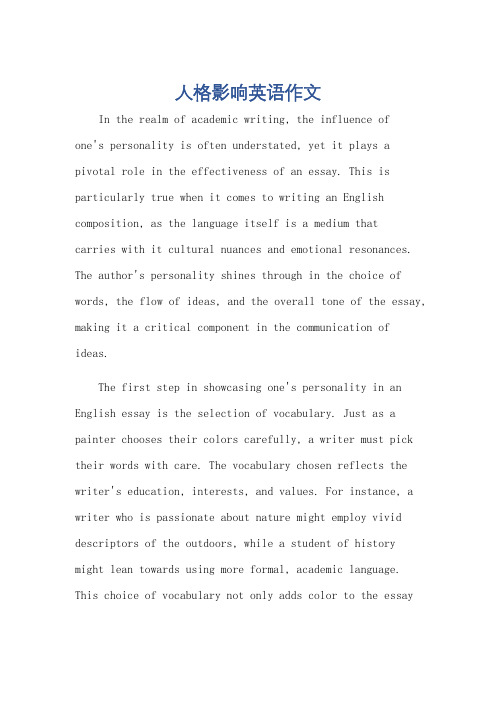
人格影响英语作文In the realm of academic writing, the influence ofone's personality is often understated, yet it plays a pivotal role in the effectiveness of an essay. This is particularly true when it comes to writing an English composition, as the language itself is a medium thatcarries with it cultural nuances and emotional resonances. The author's personality shines through in the choice of words, the flow of ideas, and the overall tone of the essay, making it a critical component in the communication of ideas.The first step in showcasing one's personality in an English essay is the selection of vocabulary. Just as a painter chooses their colors carefully, a writer must pick their words with care. The vocabulary chosen reflects the writer's education, interests, and values. For instance, a writer who is passionate about nature might employ vivid descriptors of the outdoors, while a student of history might lean towards using more formal, academic language. This choice of vocabulary not only adds color to the essaybut also helps to shape the reader's perception of the writer.The flow of ideas in an essay is also a testament to the author's personality. Some writers prefer a linear, logical structure, while others might opt for a more free-form, associative style. The way ideas are connected and developed reveals much about the writer's thinking patterns and preferences. For instance, a writer who tends to think linearly might organize their essay in a step-by-step manner, while a more associative thinker might jump from one idea to another, creating a web of interconnected thoughts.The tone of an essay is perhaps the most overt manifestation of the author's personality. Whether it's a serious, academic tone or a light-hearted, conversational style, the tone sets the mood for the entire essay. Awriter's sense of humor, their passion for a subject, or their tendency towards introspection all find their wayinto the tone of their writing. For instance, a writer who is passionate about social causes might adopt a moreimpassioned tone, while a more reserved individual mightopt for a more subdued, objective approach.Beyond these basic elements, the author's personality also impacts the essay's overall quality. A writer who is genuine and authentic in their approach will naturally engage their reader more effectively. Their unique perspective, insights, and experiences add depth and richness to the essay, making it more memorable and impactful.In conclusion, the influence of personality in English essay writing is profound. It shapes the vocabulary, flowof ideas, tone, and overall quality of the essay. By being true to their voice and style, writers can create essaysthat are not just academically sound but also deeply personal and engaging. Such essays are not just exercisesin language but also reflections of the author's inner world, making them all the more powerful and effective.**人格魅力在英语作文中的体现**在学术写作领域,作者的人格影响力常常被低估,然而它在文章的有效性方面起着至关重要的作用。
英文作文影响个性
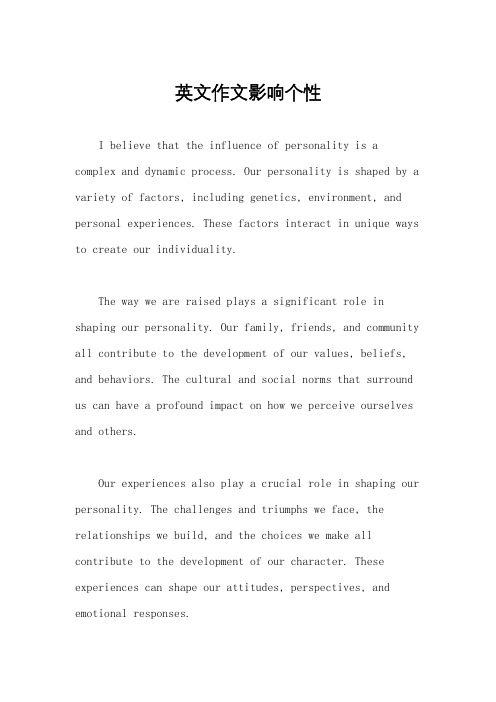
英文作文影响个性I believe that the influence of personality is a complex and dynamic process. Our personality is shaped by a variety of factors, including genetics, environment, and personal experiences. These factors interact in unique ways to create our individuality.The way we are raised plays a significant role in shaping our personality. Our family, friends, and community all contribute to the development of our values, beliefs, and behaviors. The cultural and social norms that surround us can have a profound impact on how we perceive ourselves and others.Our experiences also play a crucial role in shaping our personality. The challenges and triumphs we face, the relationships we build, and the choices we make all contribute to the development of our character. These experiences can shape our attitudes, perspectives, and emotional responses.Our genetic makeup also influences our personality. Research has shown that certain traits, such asintroversion or extroversion, may have a genetic component. Our genetic predispositions can influence our temperament, interests, and even our career choices.Our personality can also be influenced by the media and popular culture. The images, messages, and ideals that we are exposed to through television, movies, and social media can shape our self-image and influence our values and aspirations.In conclusion, our personality is influenced by a complex interplay of genetics, environment, experiences, and cultural factors. Understanding these influences can help us better understand ourselves and others, and can also help us appreciate the diversity of human personality.。
人格影响英语作文
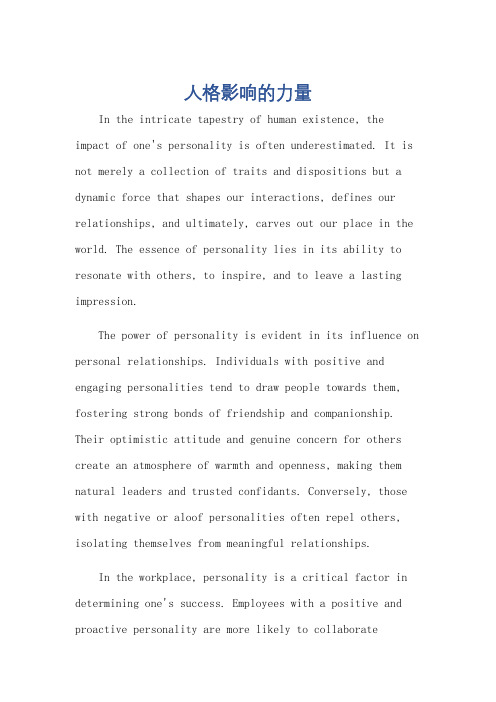
人格影响的力量In the intricate tapestry of human existence, the impact of one's personality is often underestimated. It is not merely a collection of traits and dispositions but a dynamic force that shapes our interactions, defines our relationships, and ultimately, carves out our place in the world. The essence of personality lies in its ability to resonate with others, to inspire, and to leave a lasting impression.The power of personality is evident in its influence on personal relationships. Individuals with positive and engaging personalities tend to draw people towards them, fostering strong bonds of friendship and companionship. Their optimistic attitude and genuine concern for others create an atmosphere of warmth and openness, making them natural leaders and trusted confidants. Conversely, those with negative or aloof personalities often repel others, isolating themselves from meaningful relationships.In the workplace, personality is a critical factor in determining one's success. Employees with a positive and proactive personality are more likely to collaborateeffectively, innovate, and overcome challenges. Their enthusiasm and can-do attitude inspire their colleagues, leading to increased productivity and a more positive work environment. On the other hand, individuals with a passive or negative personality can drag down the morale of the team, hindering progress and innovation.Moreover, personality plays a pivotal role in shaping one's social identity. It is often the first thing that people notice about us, and it greatly influences how we are perceived by others. A confident and outgoing personality can help us make a favorable impression, opening doors to new opportunities and experiences. Conversely, a reserved or insecure personality can limit our social circles and prevent us from fully realizing our potential.The influence of personality is not limited to personal and professional realms; it extends to our impact on society as well. Individuals with strong moral character and a sense of integrity often serve as beacons of hope and inspiration, leading by example and inspiring others to follow suit. Their actions and decisions align with theirprinciples, earning them the respect and admiration ofthose around them.However, it's important to recognize that personalityis not static; it evolves and adapts over time. While some aspects of our personality may be inherent, we can always work towards improving and refining it. By cultivating positive habits, engaging in meaningful activities, and seeking feedback from others, we can gradually shape our personality into one that is more resilient, empathetic,and influential.In conclusion, the impact of personality is profoundand multifaceted. It shapes our relationships, determines our success, defines our social identity, and influencesour impact on society. By understanding and harnessing the power of our personality, we can create positive change in our lives and in the lives of others.**人格影响的力量**在纷繁复杂的人类生活画卷中,个人性格的影响力常常被低估。
影响人们个性的因素英语作文
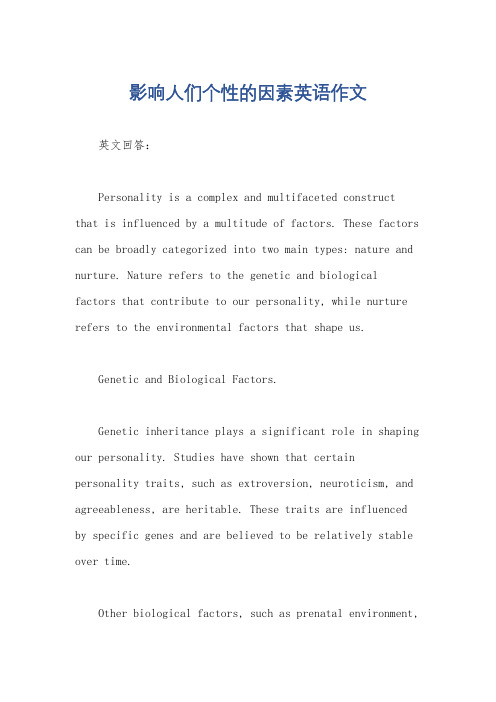
影响人们个性的因素英语作文英文回答:Personality is a complex and multifaceted constructthat is influenced by a multitude of factors. These factors can be broadly categorized into two main types: nature and nurture. Nature refers to the genetic and biologicalfactors that contribute to our personality, while nurture refers to the environmental factors that shape us.Genetic and Biological Factors.Genetic inheritance plays a significant role in shaping our personality. Studies have shown that certainpersonality traits, such as extroversion, neuroticism, and agreeableness, are heritable. These traits are influenced by specific genes and are believed to be relatively stable over time.Other biological factors, such as prenatal environment,birth order, and temperament, can also influence personality. For example, children who are exposed to prenatal stress are more likely to develop anxious or fearful personalities, while first-born children tend to be more conscientious and responsible.Environmental Factors.Nurture refers to the environmental factors that influence personality. These factors include family, culture, peers, and experiences.Family.Family is one of the most powerful influences on personality development. The parenting style, sibling relationships, and overall family environment can significantly shape a child's personality. For example, children who are raised in warm and supportive families tend to be more secure and outgoing, while children who are raised in harsh or neglectful families may develop more anxious or aggressive traits.Culture.Culture plays a significant role in shaping personality. Cultural values, norms, and beliefs can influence how we think, feel, and behave. For example, cultures that emphasize individualism tend to produce more independentand self-reliant individuals, while cultures that emphasize collectivism tend to produce more interdependent and group-oriented individuals.Peers.Peers can also influence personality development. Friends and classmates can provide companionship, support, and feedback, which can shape a child's self-concept and behavior. For example, children who are surrounded by positive and supportive peers tend to have higher self-esteem and better social skills, while children who are surrounded by negative or antisocial peers may develop more problematic personality traits.Experiences.Life experiences can also have a significant impact on personality. Traumatic events, such as abuse, neglect, or natural disasters, can lead to lasting changes in personality. Positive experiences, such as success, travel, or meaningful relationships, can also shape our personality in a positive way.Interaction of Nature and Nurture.Personality is not solely determined by either nature or nurture, but rather by the interaction of both factors. Genetic predispositions can influence how we respond to environmental factors, and environmental factors can influence how our genes are expressed.For example, a child who is genetically predisposed to be extroverted may be more likely to seek out social interactions, which can further strengthen their extroverted personality. Conversely, a child who is genetically predisposed to be shy may be more likely toavoid social interactions, which can reinforce their shy personality.中文回答:影响人格的因素。
我都性格对我人际交往的影响的英语作文
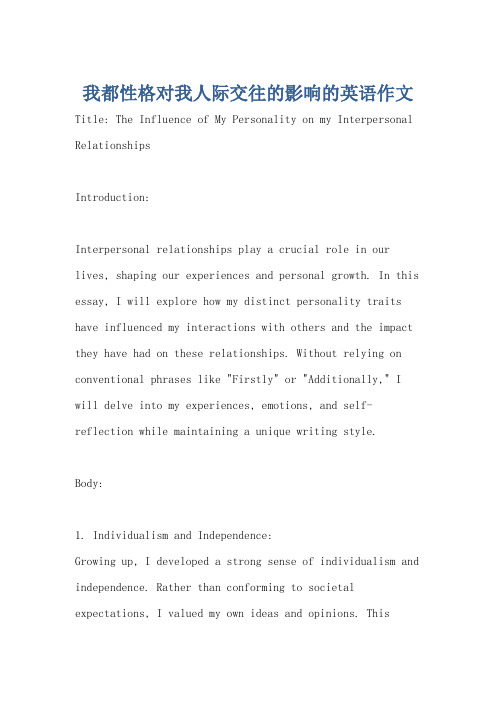
我都性格对我人际交往的影响的英语作文Title: The Influence of My Personality on my Interpersonal RelationshipsIntroduction:Interpersonal relationships play a crucial role in our lives, shaping our experiences and personal growth. In this essay, I will explore how my distinct personality traits have influenced my interactions with others and the impact they have had on these relationships. Without relying on conventional phrases like "Firstly" or "Additionally," I will delve into my experiences, emotions, and self-reflection while maintaining a unique writing style.Body:1. Individualism and Independence:Growing up, I developed a strong sense of individualism and independence. Rather than conforming to societal expectations, I valued my own ideas and opinions. Thissometimes resulted in clashes with people who had different perspectives. Nevertheless, my unique viewpoint often led to meaningful discussions that broadened both their understanding and mine.2. Empathy and Emotional Sensitivity:My natural ability to empathize with others has greatly influenced the way I approach interpersonal relationships. By recognizing and understanding the emotions of those around me, I am able to establish deeper connections with them. Despite occasional challenges in managing overwhelming emotions and maintaining healthy boundaries, this empathetic nature has helped me build trust and strengthen bonds with friends, colleagues, and loved ones.3. Introversion vs Extroversion:As an introvert navigating an extroverted world, social interaction has always been a source of inner conflict for me. While I often enjoy engaging with others onintellectual topics or one-on-one conversations, large social gatherings drain my energy quickly. Striking a balance between nurturing existing connections and seekingsolitude is crucial for maintaining healthy interpersonal relationships without compromising my need for alone time.4. Open-mindedness and Acceptance:I pride myself on being open-minded when it comes todiverse viewpoints, beliefs, cultures, and lifestyles. This attitude allows me to appreciate the richness thatdifferent perspectives bring to conversations. However, at times it also poses difficulties when encountering individuals with extreme or conflicting beliefs.Maintaining a respectful dialogue, even in the face of disagreement, has been a key challenge for me.5. Assertiveness and Conflict Resolution:My assertive nature encourages honest and direct communication, which can be valuable in resolving conflicts. By addressing issues promptly and constructively, I aim to promote understanding and find mutually beneficial resolutions. Despite occasional confrontations resulting from my forthrightness, this approach has helped memaintain healthier and more authentic relationships basedon trust and effective communication.Conclusion:In conclusion, my unique personality traits have had both positive and negative influences on my interpersonal relationships. My individualism enhances intellectual discussions but may create tensions with those holding contrasting views. Empathy facilitates deeper connections while requiring self-care to manage emotional sensitivity. Balancing introversion and extroversion ensures meaningful interactions without neglecting personal needs. Open-mindedness promotes inclusivity but necessitates navigating discordant beliefs tactfully. Finally, assertiveness facilitates conflict resolution while occasionally leading to confrontation.By embracing these characteristics as part of who I am, I strive to continuously improve my interpersonal skills while being true to myself. Ultimately, understanding the impact of my personality traits allows me to develop healthier, more supportive connections with the people in my life.。
有关性格的英语作文
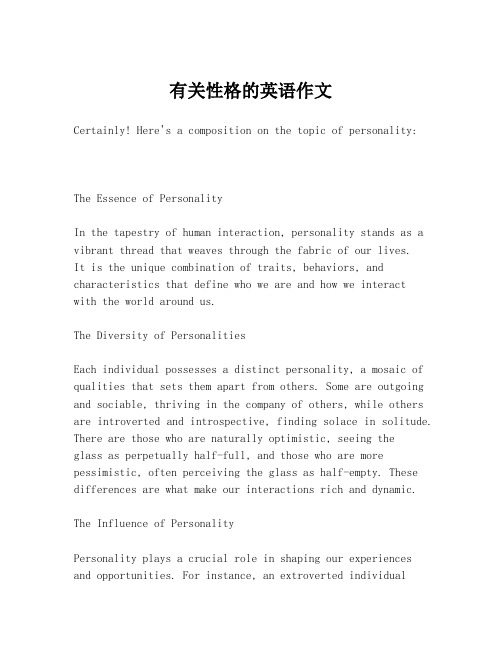
有关性格的英语作文Certainly! Here's a composition on the topic of personality:The Essence of PersonalityIn the tapestry of human interaction, personality stands as a vibrant thread that weaves through the fabric of our lives.It is the unique combination of traits, behaviors, and characteristics that define who we are and how we interactwith the world around us.The Diversity of PersonalitiesEach individual possesses a distinct personality, a mosaic of qualities that sets them apart from others. Some are outgoing and sociable, thriving in the company of others, while others are introverted and introspective, finding solace in solitude. There are those who are naturally optimistic, seeing theglass as perpetually half-full, and those who are more pessimistic, often perceiving the glass as half-empty. These differences are what make our interactions rich and dynamic.The Influence of PersonalityPersonality plays a crucial role in shaping our experiences and opportunities. For instance, an extroverted individualmight excel in a sales role, where networking and communication are key, while an introvert might find more fulfillment in a research position that allows for deep thought and solitary work. Similarly, a person with a high level of conscientiousness might thrive in a structured environment, whereas someone with a more spontaneous personality might excel in creative fields.Developing PersonalityPersonality is not a fixed trait; it can evolve over time. Through experiences, education, and self-reflection, individuals can grow and adapt. For example, someone who is naturally shy might develop their social skills to become more comfortable in group settings. Likewise, a person who is impulsive can learn to be more thoughtful and measured in their actions.The Importance of Understanding PersonalityUnderstanding one's own personality and that of others is essential for effective communication and relationship building. It allows us to tailor our interactions to better suit the needs and preferences of those around us. It also fosters empathy and compassion, as we come to appreciate the unique perspectives that different personalities bring to the table.ConclusionIn conclusion, personality is a multifaceted aspect of humannature that shapes our lives in profound ways. It is a testament to the diversity of human experience and a reminder of the importance of embracing and understanding the differences that make each of us unique. By recognizing and appreciating the nuances of personality, we can build stronger relationships and create a more harmonious society.This composition touches on various aspects of personality, its impact on life, and the importance of understanding itfor personal growth and social harmony.。
对我性格的主要影响英语作文180
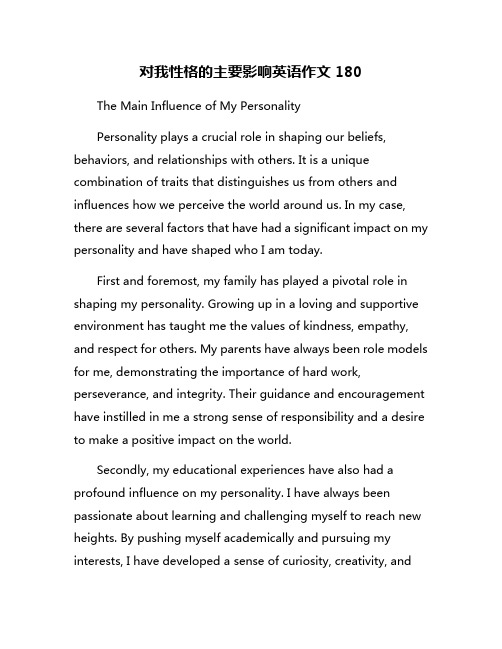
对我性格的主要影响英语作文180The Main Influence of My PersonalityPersonality plays a crucial role in shaping our beliefs, behaviors, and relationships with others. It is a unique combination of traits that distinguishes us from others and influences how we perceive the world around us. In my case, there are several factors that have had a significant impact on my personality and have shaped who I am today.First and foremost, my family has played a pivotal role in shaping my personality. Growing up in a loving and supportive environment has taught me the values of kindness, empathy, and respect for others. My parents have always been role models for me, demonstrating the importance of hard work, perseverance, and integrity. Their guidance and encouragement have instilled in me a strong sense of responsibility and a desire to make a positive impact on the world.Secondly, my educational experiences have also had a profound influence on my personality. I have always been passionate about learning and challenging myself to reach new heights. By pushing myself academically and pursuing my interests, I have developed a sense of curiosity, creativity, anddetermination. My teachers and mentors have inspired me to strive for excellence and to never give up on my dreams.Furthermore, my social interactions have played a crucial role in shaping my personality. Building relationships with others has taught me the importance of communication, empathy, and cooperation. By working collaboratively with my peers, I have learned to appreciate different perspectives and to value diversity. These interactions have helped me develop strong interpersonal skills and have nurtured my ability to connect with others on a deeper level.Additionally, my experiences with challenges and setbacks have also influenced my personality. Facing adversity has taught me resilience, perseverance, and the importance of maintaining a positive attitude in the face of obstacles. By overcoming difficulties and learning from my mistakes, I have become more confident, self-aware, and adaptable. These experiences have taught me that failure is not the end but an opportunity for growth and self-improvement.In conclusion, my personality is a reflection of the people, experiences, and challenges that have shaped me throughout my life. My family, education, social interactions, and struggles have all played a significant role in molding who I am today. Byembracing these influences and learning from them, I have become a more compassionate, determined, and resilient individual. I am grateful for the impact they have had on my personality and look forward to continued growth andself-discovery in the future.。
个性不会改变英语作文
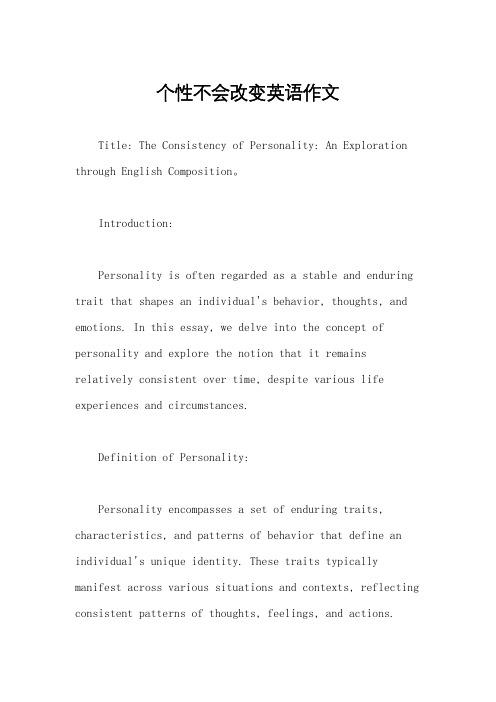
个性不会改变英语作文Title: The Consistency of Personality: An Exploration through English Composition。
Introduction:Personality is often regarded as a stable and enduring trait that shapes an individual's behavior, thoughts, and emotions. In this essay, we delve into the concept of personality and explore the notion that it remainsrelatively consistent over time, despite various life experiences and circumstances.Definition of Personality:Personality encompasses a set of enduring traits, characteristics, and patterns of behavior that define an individual's unique identity. These traits typically manifest across various situations and contexts, reflecting consistent patterns of thoughts, feelings, and actions.Evidence of Stability:Numerous longitudinal studies have provided compelling evidence for the stability of personality traits across the lifespan. For instance, research conducted by Roberts and DelVecchio (2000) found that personality traits such as extraversion, neuroticism, and conscientiousness demonstrated remarkable stability over a period of several decades.The Role of Genetics:Genetic factors play a significant role in shaping personality traits. Twin studies have consistently shown that identical twins raised in different environments still exhibit remarkable similarities in their personalities, highlighting the genetic underpinnings of personality.Environmental Influences:While genetics lay the foundation for personalitydevelopment, environmental factors also contribute to its expression. Life experiences, cultural influences, and social interactions can shape how personality traits manifest in individuals.Developmental Changes:While personality tends to exhibit stability over time, it is not entirely immutable. Developmental milestones, such as adolescence and early adulthood, may witness fluctuations in certain personality traits as individuals navigate life transitions and identity formation processes.Adaptation versus Change:It is essential to distinguish between adaptive changes in behavior and enduring shifts in personality. While individuals may adapt their behavior to suit different situations, the core aspects of their personality remain relatively constant.The Influence of Therapy and Intervention:Psychological interventions and therapeutic approaches can facilitate self-awareness, emotional regulation, and behavioral change. However, these interventions typically target specific aspects of behavior rather than fundamentally altering core personality traits.Conclusion:In conclusion, the notion that personality remains unchanged is supported by empirical evidence andtheoretical frameworks in psychology. While individuals may undergo developmental changes and adapt their behavior in response to life experiences, the core aspects of their personality exhibit remarkable stability over time. Understanding the consistency of personality can offer valuable insights into human behavior, relationships, and personal growth.。
我认为影响我性格的主要是环境英语作文

我认为影响我性格的主要是环境英语作文The environment plays a significant role in shaping one's personality and character. From the influences of family, friends, school, and society as a whole, our behaviors, beliefs, and attitudes are constantly being molded and influenced by the world around us. As for me, I believe that the environment has had a profound impact on my personality in various ways.First and foremost, my family has been a major influence on my character development. Growing up in a loving and supportive household has taught me the values of kindness, respect, and empathy. My parents have always encouraged me to be independent, hardworking, and honest, which has shaped me into the responsible and driven individual that I am today. Their positive influence has played a crucial role in shaping my values and morals.Moreover, my interactions with friends and peers have also played a significant role in shaping my personality. The people we surround ourselves with often reflect back to us who we are and what we stand for. I am fortunate to have a group of friends who are kind, supportive, and understanding, and who challenge me to be a better person every day. Through our sharedexperiences, conversations, and adventures, I have learned the importance of friendship, loyalty, and teamwork.Furthermore, the educational environment has had a profound impact on my personality. School has provided me with the knowledge, skills, and opportunities to grow and develop as a person. It has encouraged me to think critically, solve problems creatively, and communicate effectively. The challenges and successes I have faced in academics have taught me resilience, perseverance, and the value of hard work. Additionally, my teachers and mentors have played a crucial role in shaping my character by inspiring me to strive for excellence and to never stop learning.Lastly, the wider social and cultural environment has also influenced my personality in various ways. Living in a diverse and multicultural society has exposed me to different perspectives, beliefs, and traditions. This has taught me to be open-minded, tolerant, and respectful of others. The media, technology, and the internet have also played a role in shaping my personality by exposing me to new ideas, cultures, and ways of thinking.In conclusion, the environment has a powerful influence on shaping our personalities and characters. From our family and friends to our schools and society, the world around us shapeswho we are and who we become. As for me, I am grateful for the positive influences that have shaped my values, beliefs, and attitudes. I believe that by being mindful of our environment and the influences that surround us, we can continue to grow and develop as individuals.。
关于性格的初三英语作文
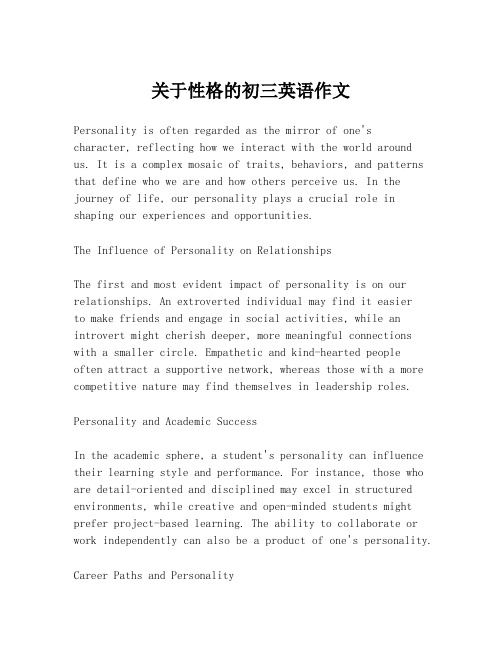
关于性格的初三英语作文Personality is often regarded as the mirror of one's character, reflecting how we interact with the world around us. It is a complex mosaic of traits, behaviors, and patterns that define who we are and how others perceive us. In the journey of life, our personality plays a crucial role in shaping our experiences and opportunities.The Influence of Personality on RelationshipsThe first and most evident impact of personality is on our relationships. An extroverted individual may find it easierto make friends and engage in social activities, while an introvert might cherish deeper, more meaningful connections with a smaller circle. Empathetic and kind-hearted peopleoften attract a supportive network, whereas those with a more competitive nature may find themselves in leadership roles.Personality and Academic SuccessIn the academic sphere, a student's personality can influence their learning style and performance. For instance, those who are detail-oriented and disciplined may excel in structured environments, while creative and open-minded students might prefer project-based learning. The ability to collaborate or work independently can also be a product of one's personality.Career Paths and PersonalityWhen it comes to choosing a career, personality traits can be a guiding factor. Some professions require assertiveness and confidence, such as sales or law, while others, like research or writing, might suit individuals who are more introspective and analytical. Understanding one's personality can help in making informed career choices that align with personal strengths and preferences.Personality Development and GrowthPersonality is not static; it evolves with time and experiences. Through self-awareness and a willingness to adapt, individuals can work on their weaknesses and enhance their strengths. For example, someone who is naturally shy can develop public speaking skills to boost their confidence in social situations.ConclusionIn conclusion, personality is a powerful determinant in various aspects of life, from forming relationships to achieving academic and professional success. Recognizing and understanding one's personality can lead to personal growth and a more fulfilling life journey. It is essential to remember that while our personalities shape our paths, they do not limit us. With self-improvement and a proactive approach, we can navigate through life's challenges and opportunities with grace and resilience.。
人的性格英语作文
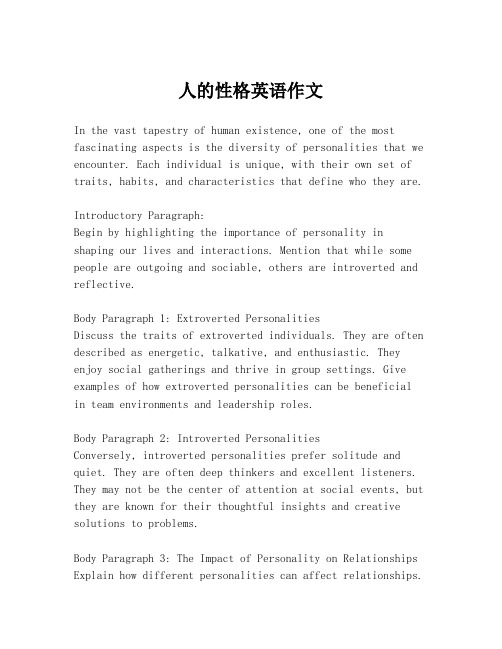
人的性格英语作文In the vast tapestry of human existence, one of the most fascinating aspects is the diversity of personalities that we encounter. Each individual is unique, with their own set of traits, habits, and characteristics that define who they are.Introductory Paragraph:Begin by highlighting the importance of personality in shaping our lives and interactions. Mention that while some people are outgoing and sociable, others are introverted and reflective.Body Paragraph 1: Extroverted PersonalitiesDiscuss the traits of extroverted individuals. They are often described as energetic, talkative, and enthusiastic. They enjoy social gatherings and thrive in group settings. Give examples of how extroverted personalities can be beneficialin team environments and leadership roles.Body Paragraph 2: Introverted PersonalitiesConversely, introverted personalities prefer solitude and quiet. They are often deep thinkers and excellent listeners. They may not be the center of attention at social events, but they are known for their thoughtful insights and creative solutions to problems.Body Paragraph 3: The Impact of Personality on Relationships Explain how different personalities can affect relationships.The balance between extroverts and introverts can lead to a harmonious partnership, where one person's strengths complement the other's weaknesses.Body Paragraph 4: The Influence of Personality on Career ChoicesDescribe how personality traits can guide career paths. For instance, extroverted individuals might excel in careers that require networking and public speaking, while introverts might prefer roles that involve research or solitary work.Body Paragraph 5: The Fluidity of PersonalityAcknowledge that personality is not static. People can develop and change over time, influenced by experiences and personal growth. This fluidity allows for personal development and the ability to adapt to different situations.Conclusion:End with a summary of the importance of understanding and appreciating the diversity of human personalities. Emphasize that recognizing and respecting these differences can lead to richer, more fulfilling relationships and a more inclusive society.This essay structure provides a framework for discussing the topic of human personality in English, focusing on the main characteristics of extroverted and introverted individuals, their impact on relationships and career choices, and the dynamic nature of personality.。
性格的影响英语作文
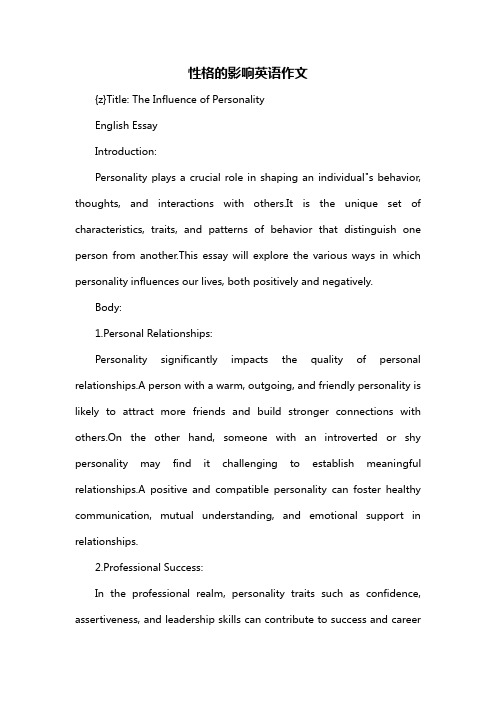
性格的影响英语作文{z}Title: The Influence of PersonalityEnglish EssayIntroduction:Personality plays a crucial role in shaping an individual"s behavior, thoughts, and interactions with others.It is the unique set of characteristics, traits, and patterns of behavior that distinguish one person from another.This essay will explore the various ways in which personality influences our lives, both positively and negatively.Body:1.Personal Relationships:Personality significantly impacts the quality of personal relationships.A person with a warm, outgoing, and friendly personality is likely to attract more friends and build stronger connections with others.On the other hand, someone with an introverted or shy personality may find it challenging to establish meaningful relationships.A positive and compatible personality can foster healthy communication, mutual understanding, and emotional support in relationships.2.Professional Success:In the professional realm, personality traits such as confidence, assertiveness, and leadership skills can contribute to success and careergrowth.A person with a dynamic and charismatic personality may excel in roles that require public speaking, team management, or client interaction.Conversely, individuals with a more reserved or timid personality may struggle in such positions.However, possessing qualities like empathy, patience, and strong work ethic can also lead to success in various career paths.3.Mental and Physical Health:Personality traits can have a profound impact on an individual"s mental and physical well-being.For example, a positive and optimistic personality may help in coping with stress, adversity, and health challenges.Such individuals are more likely to maintain good mental health and have a strong immune system.Conversely, a negative or pessimistic personality can lead to increased stress levels, anxiety, and even impact physical health.It is essential to cultivate a balanced and resilient personality to promote overall well-being.4.Problem-Solving and Decision-Making:Different personality traits can influence an individual"s approach to problem-solving and decision-making.A calm and analytical personality may enable a person to make rational decisions and solve complex problems effectively.On the other hand, a personality that is impulsive or prone to emotional reactions may lead to hasty decisions and poor problem-solving strategies.Developing a well-rounded personality thatcombines logical thinking and emotional intelligence can enhance one"s ability to navigate challenges and make informed decisions.Conclusion:In conclusion, personality plays a multifaceted role in various aspects of our lives.It influences personal relationships, professional success, mental and physical health, as well as problem-solving abilities.While certain personality traits may provide advantages in specific areas, it is crucial to cultivate a well-rounded and balanced personality to lead a fulfilling life.Embracing self-awareness, personal growth, and continuous improvement can help individuals maximize the positive impact of their personality and mitigate any potential drawbacks.。
性格的影响 英语作文

性格的影响英语作文Title: The Impact of Personality on Individuals。
Personality plays a significant role in shaping individuals' lives, influencing their behaviors, decisions, and interactions with the world around them. Understanding the impact of personality traits can provide insights into why people behave the way they do and how they navigate various situations in their lives.Firstly, extraversion is one of the most widely studied personality traits. Extraverts tend to be outgoing, sociable, and energetic. They thrive in social settings, enjoy being around people, and often seek out new experiences. In contrast, introverts are more reserved, preferring solitary activities and smaller social gatherings. Their energy tends to be directed inward, and they may find large social events draining. This fundamental difference in personality can affect various aspects of life, from career choices to social interactions.For example, extraverts may excel in professions thatrequire networking and public speaking, such as sales or marketing, while introverts may prefer roles that allowthem to work independently, such as programming or writing.Secondly, conscientiousness refers to the tendency tobe organized, responsible, and goal-oriented. Highly conscientious individuals are diligent in their work, pay attention to detail, and strive for excellence. They are more likely to succeed academically and professionally dueto their disciplined approach to tasks. In contrast, individuals low in conscientiousness may struggle with procrastination, disorganization, and impulsivity, whichcan hinder their success in various domains. Understanding one's level of conscientiousness can help individuals capitalize on their strengths and develop strategies to mitigate their weaknesses.Furthermore, openness to experience reflects the willingness to embrace new ideas, cultures, and experiences. Open individuals are imaginative, curious, and creative. They enjoy exploring new concepts, traveling to unfamiliarplaces, and engaging in intellectual discussions. In contrast, individuals low in openness may be more traditional, conservative, and resistant to change. This personality trait can influence individuals' career choices, hobbies, and relationships. For example, open individuals may thrive in innovative fields such as technology, design, or the arts, where creativity and adaptability are highly valued.Additionally, agreeableness refers to the tendency tobe compassionate, cooperative, and considerate of others. Agreeable individuals are empathetic, trusting, and altruistic. They prioritize harmonious relationships andare willing to compromise to maintain peace. In contrast, individuals low in agreeableness may be more skeptical, competitive, and assertive. This personality trait can impact individuals' interpersonal relationships, communication styles, and conflict resolution strategies. For example, agreeable individuals may excel in roles that require teamwork and customer service, while less agreeable individuals may thrive in competitive environments such as sales or negotiation.Lastly, neuroticism reflects the tendency to experience negative emotions such as anxiety, depression, and insecurity. Neurotic individuals are prone to worry, stress, and mood swings. They may have difficulty coping with adversity and may be more susceptible to mental health issues. In contrast, individuals low in neuroticism tend to be emotionally stable, resilient, and optimistic. This personality trait can influence individuals' coping mechanisms, decision-making processes, and overall well-being. For example, neurotic individuals may benefit from mindfulness practices, therapy, or stress management techniques to improve their mental health and quality of life.In conclusion, personality traits have a profoundimpact on individuals' lives, shaping their thoughts, feelings, and behaviors. By understanding their own personality profiles, individuals can gain insights into their strengths and weaknesses, make informed decisions,and cultivate personal growth. Moreover, recognizing and appreciating the diversity of personality traits canenhance empathy, communication, and collaboration in various social and professional contexts.。
性格英语作文
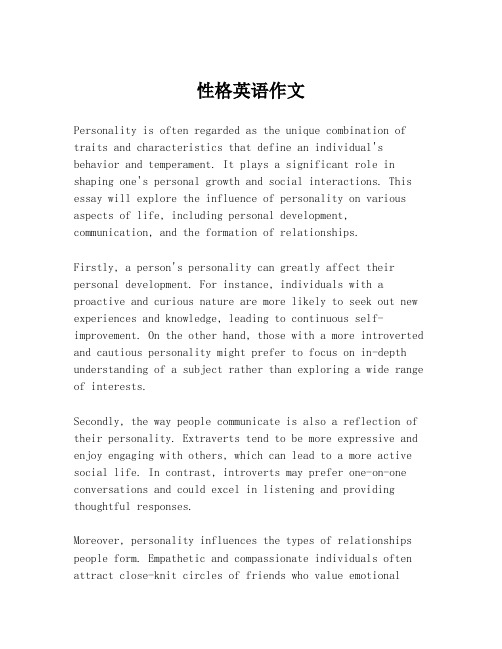
性格英语作文Personality is often regarded as the unique combination of traits and characteristics that define an individual's behavior and temperament. It plays a significant role in shaping one's personal growth and social interactions. This essay will explore the influence of personality on various aspects of life, including personal development, communication, and the formation of relationships.Firstly, a person's personality can greatly affect their personal development. For instance, individuals with a proactive and curious nature are more likely to seek out new experiences and knowledge, leading to continuous self-improvement. On the other hand, those with a more introverted and cautious personality might prefer to focus on in-depth understanding of a subject rather than exploring a wide range of interests.Secondly, the way people communicate is also a reflection of their personality. Extraverts tend to be more expressive and enjoy engaging with others, which can lead to a more active social life. In contrast, introverts may prefer one-on-one conversations and could excel in listening and providing thoughtful responses.Moreover, personality influences the types of relationships people form. Empathetic and compassionate individuals often attract close-knit circles of friends who value emotionalsupport and deep connections. Meanwhile, those who are more independent and self-reliant might have a smaller social circle but enjoy the freedom and autonomy in their relationships.Furthermore, personality can impact one's career path and professional success. People with a competitive and ambitious nature may thrive in high-pressure environments and climb the corporate ladder quickly. Conversely, those who are more cooperative and prefer collaborative work might find greater satisfaction in team-oriented roles.In conclusion, personality is a fundamental aspect of who we are and how we navigate the world. It shapes our personal growth, communication styles, relationships, and career choices. Understanding one's own personality and recognizing the personalities of others can lead to more effective communication and stronger interpersonal connections. It is essential to appreciate the diversity of personalities, as each contributes uniquely to the rich tapestry of human society.。
心理学的英语作文
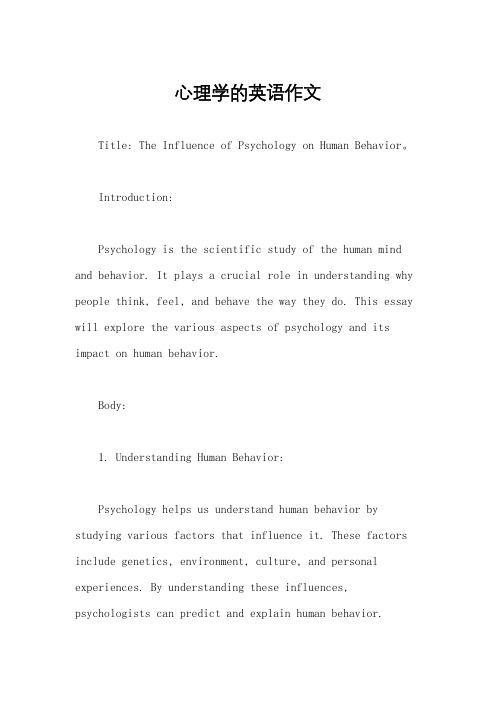
心理学的英语作文Title: The Influence of Psychology on Human Behavior。
Introduction:Psychology is the scientific study of the human mind and behavior. It plays a crucial role in understanding why people think, feel, and behave the way they do. This essay will explore the various aspects of psychology and its impact on human behavior.Body:1. Understanding Human Behavior:Psychology helps us understand human behavior by studying various factors that influence it. These factors include genetics, environment, culture, and personal experiences. By understanding these influences, psychologists can predict and explain human behavior.2. The Role of Perception:Perception refers to the way individuals interpret and make sense of the world around them. Psychology helps us understand how perception affects behavior. For example, people with a positive perception of themselves are more likely to have high self-esteem and engage in positive behaviors.3. The Power of Conditioning:Conditioning is a psychological concept that explains how behavior is learned and modified through rewards and punishments. Psychologists use conditioning techniques to change unwanted behaviors and encourage positive ones. For instance, in the case of addiction, psychologists use conditioning to help individuals overcome their dependence on harmful substances.4. The Importance of Cognitive Processes:Cognitive processes refer to the mental activities involved in acquiring, processing, and storing information. Psychology helps us understand how these processes influence behavior. For example, cognitive psychology explores how memory, attention, and problem-solving affect decision-making and behavior.5. The Impact of Social Psychology:Social psychology examines how individuals' thoughts, feelings, and behaviors are influenced by the presence of others. It helps us understand social interactions, conformity, and group dynamics. For instance, social psychology explains why people conform to group norms and how this conformity affects their behavior.6. The Role of Personality:Personality refers to the unique set of traits, behaviors, and patterns of thought that define an individual. Psychology helps us understand how personality influences behavior. For example, individuals withextroverted personalities may be more likely to engage in social activities and seek out new experiences.7. The Influence of Psychological Disorders:Psychological disorders can significantly impact behavior. Disorders such as depression, anxiety, and schizophrenia can change the way individuals think, feel, and behave. Psychology plays a crucial role in diagnosing and treating these disorders, helping individuals regain control over their behavior.Conclusion:Psychology is a multifaceted field that provides valuable insights into human behavior. By understanding the various factors that influence behavior, psychologists can predict, explain, and modify behavior effectively. The study of psychology is essential not only for professionals in the field but also for individuals seeking to understand themselves and others better.。
学生性格的变化英语作文
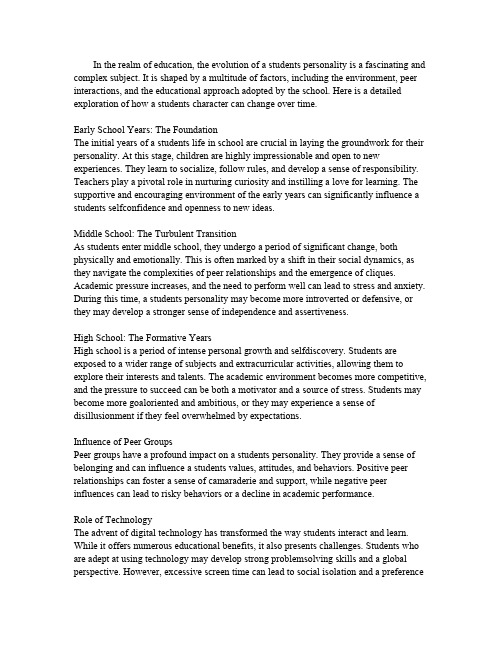
In the realm of education,the evolution of a students personality is a fascinating and complex subject.It is shaped by a multitude of factors,including the environment,peer interactions,and the educational approach adopted by the school.Here is a detailed exploration of how a students character can change over time.Early School Years:The FoundationThe initial years of a students life in school are crucial in laying the groundwork for their personality.At this stage,children are highly impressionable and open to new experiences.They learn to socialize,follow rules,and develop a sense of responsibility. Teachers play a pivotal role in nurturing curiosity and instilling a love for learning.The supportive and encouraging environment of the early years can significantly influence a students selfconfidence and openness to new ideas.Middle School:The Turbulent TransitionAs students enter middle school,they undergo a period of significant change,both physically and emotionally.This is often marked by a shift in their social dynamics,as they navigate the complexities of peer relationships and the emergence of cliques. Academic pressure increases,and the need to perform well can lead to stress and anxiety. During this time,a students personality may become more introverted or defensive,or they may develop a stronger sense of independence and assertiveness.High School:The Formative YearsHigh school is a period of intense personal growth and selfdiscovery.Students are exposed to a wider range of subjects and extracurricular activities,allowing them to explore their interests and talents.The academic environment becomes more competitive, and the pressure to succeed can be both a motivator and a source of stress.Students may become more goaloriented and ambitious,or they may experience a sense of disillusionment if they feel overwhelmed by expectations.Influence of Peer GroupsPeer groups have a profound impact on a students personality.They provide a sense of belonging and can influence a students values,attitudes,and behaviors.Positive peer relationships can foster a sense of camaraderie and support,while negative peer influences can lead to risky behaviors or a decline in academic performance.Role of TechnologyThe advent of digital technology has transformed the way students interact and learn. While it offers numerous educational benefits,it also presents challenges.Students who are adept at using technology may develop strong problemsolving skills and a global perspective.However,excessive screen time can lead to social isolation and a preferencefor virtual interactions over facetoface communication.Cultural and Socioeconomic FactorsA students background plays a significant role in shaping their personality.Cultural norms and values can influence their attitudes towards education,relationships,and career aspirations.Socioeconomic status can affect access to educational resources and opportunities,which in turn can impact a students motivation and selfesteem.The Role of Mentors and Role ModelsPositive role models,whether they are teachers,family members,or public figures,can inspire students to strive for excellence and adopt constructive behaviors.Mentors can provide guidance,encouragement,and a sense of direction,helping students navigate through challenges and setbacks.ConclusionThe journey of a students personality development is a dynamic and multifaceted process. It is influenced by a myriad of factors,each contributing to the unique character of an individual.Understanding these influences can help educators,parents,and students themselves to foster a supportive environment that encourages personal growth and resilience.。
- 1、下载文档前请自行甄别文档内容的完整性,平台不提供额外的编辑、内容补充、找答案等附加服务。
- 2、"仅部分预览"的文档,不可在线预览部分如存在完整性等问题,可反馈申请退款(可完整预览的文档不适用该条件!)。
- 3、如文档侵犯您的权益,请联系客服反馈,我们会尽快为您处理(人工客服工作时间:9:00-18:30)。
The influence of personality on the university students' career choice宋静茹201400121156刘畅201400121138赵子君201405121268杜晓炜201400121090【1】Nowadays,the problem of finding a suitable career has worried both parents and students a lot. Employment has a vital bearing on people's livelihoods. It is the fundamental prerequisite and basic approach for people to improve their lives【1】. As we all know, China has a population of nearly 1.3 billion, and is the most populous country in the world. In view of the fundamental interests of its people, the Chinese government recognizes the importance of the issue of employment. Based on the Constitution of the People's Republic of China, the Labor Law of the People's Republic of China, and other laws and regulations, the Chinese government has protected the workers' right to employment, and adopted various policies and measures to promote employment actively and steadily meet their needs for employment.So here comes these questions, will we meet with the dilemma of finding a suitable career? Do we really have any idea about what is actually fit for us? Are there any reference for us when we are choosing a career?Considering our research resources and ability, we intend to focus on the influence of personality on career choices. After all, although one person is not as same as another in the world,their personalities can still be classified in some patterns. What we aimed to do is to find the potential connection between personality and career choices. We thought that people who are outgoing tend to choose jobs that ask the quality like leadership, communication skills and accommodating, while people who are more introvert are more likely to choose stable and traditional jobs that don’t need a spirit of adventure, for example, office-bearer.Considering college students’ thoughts, we took the method of non-name questionnaire, which was relatively objective. We also added some interesting questions to attract more students to get more effective questionnaires. Thankfully, it worked very well. Then we contacted with some monitors and our old schoolmates to get some support. With the help of the internet, two hundred and fifty four college students from 15institutes including electronic information, sports and arts, in different cities in China as Nanjing, Jinan and Beijing filled the questions we set. Getting rid of the questionnaires with too many blanks, two hundred and twenty were useful.There were two main contents of our questionnaire, personality and career choice. It covered twenty two questions, twenty of which were aimed at finding out the personality and the two left were aimed at investigating the career choice. Then we gave points of the 20 questions about personality with a fixed criterion. According to the final points, we divided students into 4 types. The personality of students getting more than 90 points are typical outgoing; students getting points between 71 and 90 are a little outgoing; students getting points between 51 and 70 are both outgoing and introverted; students getting points between 31 and 50 are a little introverted; students getting less than 30 points are typical introverted.In the light of the statistical result, the typical outgoing freshmen make up 12% of the informant, while the typical introvert account for 11%.In addition, people who are little outgoing account for 17%.And 15% of the freshmen are little introvert. Most freshmen belong to people that are both introvert and outgoing, which make up 45%.With respect to the career choice, about 24% of the informants prefer to select the research occupation, such as ideologist and scientist. Approximately 26% fancy the art of occupation, for example, the designer and painter. What’s more, informants who enjoy the enterprise type of occupation make up about 40%.They want to become white collar workers and businessmen.Plus,10% of the informants desire for the traditional type of occupation, such as civil servant.John Henry Holland-----famous guide of occupation comes from America .In his book, John Holland divided personality into six types: realistic, investigate, art, social, enterprise and common. The people who have R and I personality tend to be a little introvert. .The “R” type people don’t do well in dealing with people and they always stress the important of right and money. While the “I” type people can’t become a good leader as they are short of leadership, although they are intelligent to solve difficult math problems. On the contrary, the people who have “A”“S”“E” type of personality are more outgoing than other types of people. In daily life as well as work, they are optimistic, freedom and confident. They often have a strong sense of responsibility and as a result they can deal with different kinds of people easily. At last, the “C” type people respect the discipline, attach importance to rules and forms while they lack talent in art.Based on the result of the questionnaire, most of the typical outgoing and little outgoing freshmen tend to choose the enterprise type of occupation and the art of occupation. People of this kind are passionateand imaginative, which just suits these kinds of work fine. While the major of the typical introvert and little introvert prefer to select the traditional type of occupation and research occupation. Actually, these kinds of work requires people who have a sense of responsibility and are prudent and discreet. As to people who are both introvert and outgoing, the occupation they choose is quite wide. They are friendly, inspiring and responsible. Besides, they are always ready to help others. As a consequence, the occupations they can choose and suit are quite extensive.John Henry Holland regards occupation choosing as the natural extension of personality. He thinks that the occupation you choose reflects your personality.【2】There’s no doubt that skill and source are important in your developing, but what is the most important is to find how your personality suit the occupation you have chosen. It decides if your business will succeed or not and is a key determinant of sustainable development of business【2】. If your personality is not suitabl for your job, it’ll become a big obstacle on your way, which makes you can’t be concentrated on work and causes bad consequence to not only your development but also organization. For example, if a people who has the gift in art works as a stereotyped secretary, his job motivation is declining. as a result his working efficiency must be lower than that of even an ordinary people.Whether personality is fit for occupation or not will affect the stability of a person directly. Only when your personality can adapt to the job condition can you settle down.【3】Psychologist thought that choosing occupation in terms of personality could show more skills and intelligence to others, thus doing one own job proficiently. Therefore, take your personality into consideration when you choose jobs and it will be beneficial to you to combine character and occupation reasonably【3】.【4】One kind of job need one kind of person, different people are fit for different jobs. In other words, it’s a two-way process【4】. 【5】Although personality plays an important role in occupation choosing, their relationship is not fixed. It could be influenced by working condition, living condition and social condition. As a consequence, everyone of us should adapt our personality to society, establish a correct concept of employment【5】.So we could get a conclusion that personality do has a influence on career choice. Outgoing people are more likely to choose competitive jobs and introvert people tend to choose rigorous jobs. Our expectation is that everyone could dig out something helpful for their career choosing. Though we have the opportunity to change unpleasant jobs, we still remains the necessity for us to do what we really like at first. When it comes to career choice, one ought to consider not only his interest but also his ownpersonality. In the long term, only by attaching importance to both these two aspects can a man live a stable life.References:【1】《China's Employment Situation and Policies 》【2】/Periodical_shidjm2006z1049.aspx 【3】/Periodical_sq-zh201132091.aspx【4】/Periodical_shidjm2006z1049.aspx 【5】/Periodical_kjwh201419119.aspxFor this is our first attempt to doing a research, we met with quantities of difficulties. At first ,we didn’t make a proper title. Thankfully, we correct it in time with teacher’s help. What’s more, we could find few questionnaire in English from both the internet and library,. So we translate it in English together. In addition, it’s difficult to select useful information from such various data. Last but not the least, we don’t know how to apply academic English language into our paper.。
